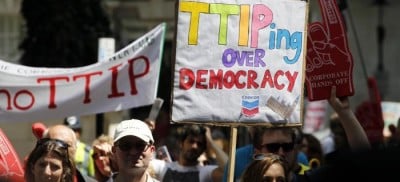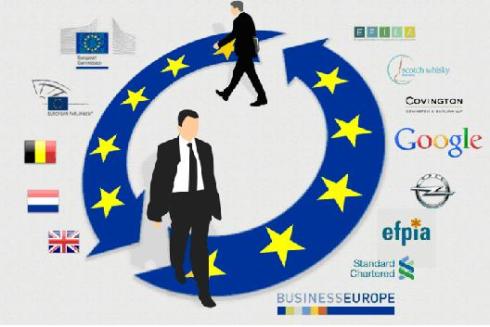
As news comes today of the huge rally in Berlin we look back to Birmingham’s part in an April Global Day of Action that saw cities from across Europe saying no to TTIP. Hundreds of demonstrations took place across the weekend from London to Barcelona and tens of thousands marched in Germany alone.
Birmingham Friends of the Earth said: “TTIP threatens our NHS, our public services, our health and safety protections and, through decisions made in secret international courts, our democracy itself.
According to the Huffington Post, the UK Trade Minister Lord Livingston has admitted that talks about the NHS were still on the table. TTIP includes Investor State Dispute Settlement, a provision giving companies the ability to sue governments for any regulations or interventions which damage their profits, making it much more difficult for governments to take meaningful action on climate. TTIP could also mean the EU accepting imports of Tar Sands oil and Shale Gas”.
A subservient EC?
In May the Guardian reported on recent revelations that in 2013, a high-level delegation from the American Chambers of Commerce (AmCham) visited EU trade officials to insist that the bloc drop its planned criteria for identifying EDCs in favour of a new impact study. Minutes of the meeting show European Commission officials pleading that “although they want the TTIP to be successful, they would not like to be seen as lowering the EU standards”.
Health concerns
Draft EU criteria could have permitted the banning of 31 pesticides containing endocrine disrupting chemicals (EDCs), but – amid fears of a trade backlash stoked by an aggressive US lobby push – legislation planned for 2014 was delayed until at least 2016, despite estimated health costs of €150bn per year in Europe from endocrine-related illnesses such as IQ loss, obesity and cryptorchidism – a condition affecting the genitals of baby boys. EU moves to regulate hormone-damaging chemicals linked to cancer and male infertility were also shelved following pressure from US trade officials over the Transatlantic Trade and Investment Partnership (TTIP) free trade deal.
Continuing to look at the 43 TTIP-related items on our database
In June we noted a SNJ report that Green MEP for the South West, Molly Scott Cato, ‘hit the stage at Glastonbury’. The Stroud-based economist joined campaigner Charlotte Church, civil liberties activist Shami Chakrabati and veteran politician Ken Livingstone to talk politics at the festival’s ‘Left Field’. She has been an outspoken critic of the Transatlantic Trade and Investment Partnership trade deal, describing it as a ‘corporate charter’. Greens have been at the forefront of the campaign against TTIP and this issue has seen the largest volume of correspondence from her constituents in the last year.
In July a reader from Tokyo (Pacific Rim countries are beset by a similar TPP negotiation) sent a link to this TTIP news:
It recorded the remarkable extent to which the revolving door between the public and private sectors – featured on a number of blogs on this site – is helping to grease the wheels of the TTIP corporate lobby.
Five days ago Business Insider reported that the European Court of Justice has ruled that the transatlantic Safe Harbour agreement, which lets American companies use a single standard for consumer privacy and data storage in both the US and Europe, is invalid. The agreement is seen as crucial if the EU and US are to press on with their plans for the Transatlantic Trade and Investment Partnership free-trade deal.
Their reporters, James Cook and Rob Price, add that there is a growing mistrust with the US in Germany, the primary reasons being:
- the scandal over mass electronic surveillance of Germans’ communications
- and the escalating refugee crisis, which many see as a result of failed American policies in the Middle East.
A widely shared distrust.
Source Article from http://www.globalresearch.ca/eu-protests-against-the-us-initiated-ttip-trade-deal/5481907
Related posts:
Views: 0
 RSS Feed
RSS Feed

















 October 14th, 2015
October 14th, 2015  Awake Goy
Awake Goy 

 Posted in
Posted in  Tags:
Tags: 
















